So there I was, playing “Over the Hills and Far Away” for the thousandth time, and making the same mistake I always make, for the thousandth time. So I stop in frustration and my last flubbed, half-muted note is mercifully put to rest. And in the other room I hear my daughter playing the piano. She’s ripping off scales with precision and speed. Bright, clear piano notes dance around the room, strutting their stuff, joyously–mocking me . And so I have a quiet moment, just me and my old Yamaha acoustic, to ponder my own musical mediocrity. And I realize that what she was doing and what I was doing were totally different. I was playing around on the guitar–little snippets of songs someone showed me long ago, or something I picked up on Youtube. But she was doing what needs to be done to get better at just about anything.
At that point I had a big “A HA!” moment. A slap-your-forehead, Homer Simpson style, DOH! moment to be sure. (Yes, I’m rather slow on the uptake.) Here’s the long and short of it summed up in one sentence:
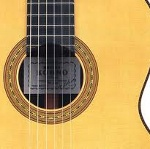
You have to practice to get better at guitar
That’s it. That was my big realization. And I know, you are thinking I’m an idiot. And you may be correct. But now, jury still out on the whole idiot thing, I’m a guy who practices to get better.
Now if you are feeling slighted by this obvious bit of advice about how to get better, then really take a hard look at what you do when you pick up the old electric. Do you have goals? Are you trying to get better by practicing certain skills every day repeatedly, or do you just play some stuff? Even if you play a lot, playing by itself with no direction, no structure, no thought behind it won’t get you where you want to go. You’ll be like I used to be: playing the same snippets of old songs over and over. Making the same mistakes and not improving at all.
Uh, but how do i practice guitar?
Excellent question.
Play and practice in equal amounts
On average I spend about 1/2 of my guitar time playing and the other 1/2 practicing. I think if you do too much playing you’ll end up with a bad case of flounding mediocrity. Oh no! But if you are sitting there doing scales all day for six hours a day then you are going to hit the wall at some point and decide that playing guitar just ain’t no fun. You’ve got to balance things out.
If I’m in “play” mode then anything is ok as long as I’ve got the guitar in my hands. Usually when I’m just playing I end up practicing the songs I’m currently working on and that’s fine. Anything is ok during guitar play time. But if I’m practicing, then I’ve got a set routine of things I need to do to get better. It’s there on paper and I check each task off as I go. Yeah, this practicing stuff sounds like work, but it will help you reach your goals whether you want to learn easy acoustic Eagles tunes or become the next Jimmy P.
Set goals and decide what you want to learn
Think hard about what you want to learn. What kind of guitarist do you want to be? Specifically what style do you want to excel at? Acoustic or electric? Jazz, rock, classical, bluegrass? Do you want to learn theory? Do you want to learn to play by ear? Flat picking or fingerstyle? If all of this sounds like too much thinkin’, then just do what I did, think about what music you want to play and go from there.
My goals are simple. I want to be able to play 70s and 80s rock songs from my childhood well–to rise above my current level: floundering mediocrity! I love Led Zeppelin, AC/DC, Pink Floyd and lately I’ve been into the Allman Brothers’ Dicky Betts sound. So my practice schedule reflects this goal. I want to be able to play cool lead stuff like the Stairway solo and the Comfortably Numb solo, so now I’m learning the pentatonic scale (minor pentatonic for now), and doing finger agility exercises up and down the neck, hammer ons and pull offs, etc. I’ve written everything down so I don’t leave anything out.
What specifically do I practice to achieve my goals?
Once you’ve decided which songs you want to be able to play or what type of guitarist you want to be, then you need to practice the specific drills and techniques that will get you where you want to go. And here’s where things get tricky and I think you may want to search out a good guitar teacher at this point. The whole “self taught” vs. professional guitar instructor debate is like the Fender vs. Gibson: which is better? debate. You’ll have to decide what you want to do. How much money and time do you want to invest? I think if you are serious about guitar you should get a teacher. I started with a good teacher back in the day and I’m glad I did. Especially if you are starting out you might want to consider finding a guitar teacher who can draw up a nice practice routine to get you going quickly.
So while I can’t draw up a plan for you, I can tell you about my own plan of attack which may (or may not!) be enlightening
My goals are simple: I just want to play 70s and 80s bluesy rock lead stuff well. The Stairway solo (studio version) is my own little Mt. Everest, and for a guy who’s never really practiced playing lead, it is a mountain.
My current practice routine (as of 2012 October-ish) is based on several different (online) guitar instructors, but mainly is from the excellent speed building routine from Allen Van Wert. The lesson I’m referring to is in Allen’s videos at JamPlay.com. Allen’s website is here which has other good stuff: https://www.allenvanwert.com/. I just checked the site and he’s got a book called Robot’s Technical Guitar which I think details what he calls his “warm up”, which is the core of my dexterity, strength and speed building exercises.
Here’s the skinny on my routine (based on Allen Van Wert’s Jamplay vids)
- Chromatic, non-musical dexterity drills. Most people do the old chromatic 1234 on the 6th string then the 5th, 4th, 3rd etc. and call it done. Allen’s routine covers every possible fingering, for example 1234, 1243, 1342, 1423, etc. Starting with the index or #1 finger, and the ring, middle and pinky finger. And his routine covers the whole neck, not just the first position. I only do one of the possible fingerings per session. Lately I like to start with the pinky because that’s my weak link, so I’ll do a 4132 or the dreaded 4231.
- Hammer-on and pull-off drills. Again, Allen’s HO and PO drills are Marine-like in intensity, designed to take your poor fingers on a bit of a death march up and down the neck. When I first started doing them, I couldn’t finish because my fingers just gave out. It’s actually kind of funny when your pinky just stops accepting commands from your brain. And even if I had a drill sergeant yelling at me (and my pinky) it wouldn’t help. (And yes, at that point I stop. The standard rule of thumb is when you feel any pain in your hands/wrist/arm etc., you should stop. For me, if it’s a workout style burn, then I’m fine with pushing through.)
- Picking exercises: Down down, down up, up up, up down, and economy picking with two fingers. Of course, you start with your index finger and do 1-2, then 1-3, then 1-4. Then start with your ring finger: 2-1, 2-3, etc. And then start with your middle and pinky.
- String skipping: Hold your index finger on the 6th string first fret, then play 2-3 (ring and middle) on the 6th string second and third fret, then 5th string second and third fret, then 6th string and 4th string, then 6th and 3rd, etc.
- Then I practice the pentatonic scale, mainly the 1st position scale, and the extended pentatonic.
- Lastly I practice a particular song or solo I’m learning at that time. When I play I really try to focus on my trouble spots. When I hit a section that is difficult I slow it down and really think about how I can play it in a more efficient way. I usually start by thinking about my right hand: how exactly should I hit those notes? Up or down picking, economy picking, can I just do a hammer on or a pull off at that point. I find if I really slow things down and start with my right hand, I can figure a way to play a difficult section more easily.
My routine here takes about 40 minutes. I do this about four times a week. I have a wrinkled sheet of paper that I’ve written everything down on. It helps me to not forget anything!
Using a timer
Some people use a timer when they practice. Instead of trudging through each exercise until their fingers expire or they pass out, they work on something for a set time, then on to the next thing. I think this is a fantastic idea and one I’ll probably incorporate into my own evolving practice routine. A simple egg timer is perfect. Set the timer for 5 minutes: hit the pentatonic scale with a vengeance, playing cleanly of course, then on to the next exercise when the bell rings. If this is just too dang structured for you then by all means skip it.
Go slow
When you are trying to play a solo or scale that is faster than you can play, make sure to play it very slowly at first. Make sure to play it clean. Hit every note. Then gradually increase the speed. Then play it slow again, then a little faster. The occasionally hit it full speed. Usually I know when I’m playing something too fast because my fingers sort of train wreck on the fret board. It all just falls apart. And I laugh and slow down. Don’t be the guy on youtube posting his triumphant rendition of some fast solo that we all know by heart who sounds like he’s hitting every third note. Don’t be That Guy! or Girl! Play it slow and clean and the speed will come. (Or so I keep telling myself!) Check out BillyBadAxe.com’s play faster right hand picking technique explanation.
Practice routines naturally evolve
Don’t think your routine is set in stone. It’s ok to tweak things here and there. I will eventually add ear training into my routine and to keep the total practice time around 40 minutes I may add an egg timer into the mix so I don’t go too long with each section. The amount of time you practice is up to you. Sometimes I’ll break my 40 minute routine into several 20 minute sessions during the day. Make sure your schedule work for you. If you are practicing for 10 minutes a day, that’s fine! The worst thing you could do is to overdo it and quit.
Have fun
One thing I used to forget is that playing guitar is supposed to be fun. So if you hate practicing, that’s fine, shorten your practice time and make sure you are doing what you need to do when you practice to get better. Again, a guitar teacher might be helpful there. That said, I do believe that actual practice is the only way to get better.
Please let me know about your practice routine. What made you a better guitarist? Enlighten us in the comments section below!
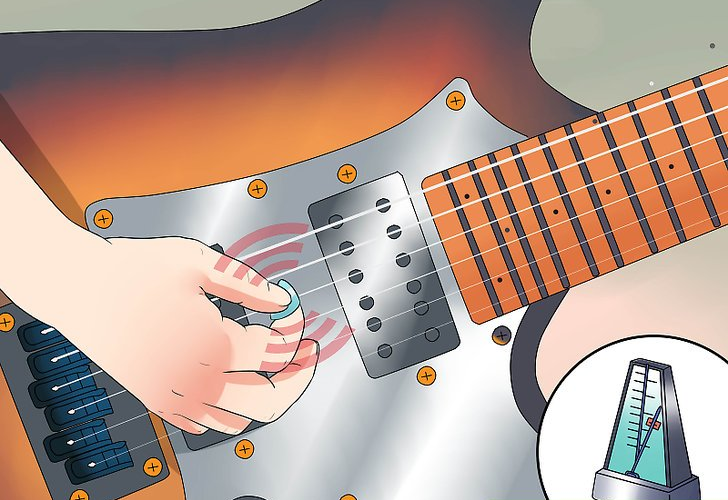

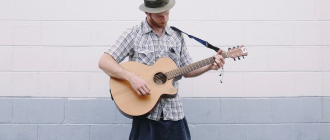

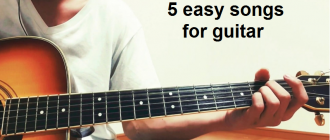
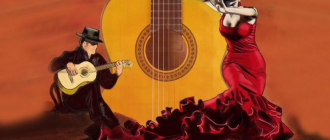

Allen is awesome! Do what he says and you WILL improve.
Yep. That dude rocks. He lays things out really nice, especially for analytical types like me!
I come from a long line of working musicians; people that actually made a living playing music for some or all of their lives. It was a great personal disappointment when I realized that when it came to a “natural musical ability”, I came from the shallow end of the gene pool. Plenty of musicians with no patience to help me even get started until I was 14. I got a yamaha bass and a trace amp that I loved. I also fooled around aimlessly trying to play what I heard listening to McCartney, Billy Sheehan, Stu Hamm, Flea, and Les Claypool… Setting the bar that high, I was doomed from the start! I picked up a old epiphone genesis that was my first shot at guitar. Jimi, Stevie Ray, Eddie and Morse were the guys I liked alot, so here we go again… No direction, no clue. Over the years, the itch to really put some time in and take lessons came and went. I’m the youngest of 3; my brother plays for a living, my sister who never had any intrest in playing the radio even… and yours truly. We lost my father a few years ago, and it was then I realized my brother is the LAST musician to carry our name. When my brother dies, that’s it. The music carried in the hearts of our family since the beginning, dies with him. I can’t let that happen, and I still have the itch! I wrote you this to thank you for helping me with a kind of road map for where my journey should begin.
Hey Capquack, Let the journey begin, man! Enjoy the ride and don’t worry about natural ability. You’ve already got enough. Thanks for the great post and good luck forward. Dave